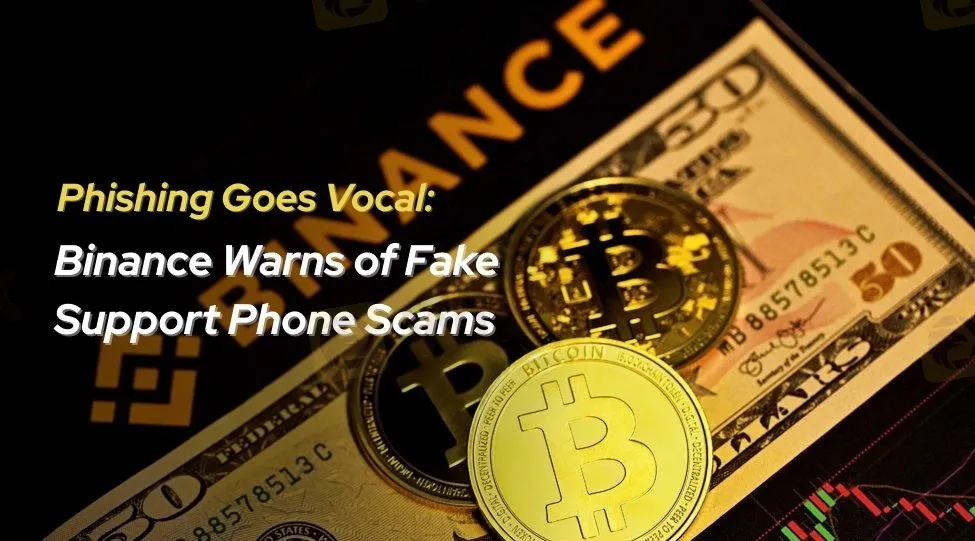Phishing Goes Vocal: Binance Warns of Fake Support Phone Scams
Abstract:Binance introduces SMS-based security codes as scammers shift tactics from links to phone call traps.

Cryptocurrency exchange Binance has issued a warning regarding a wave of phishing scams that are now taking the form of SMS messages urging recipients to call a fake support number, rather than clicking a suspicious link.
These messages, designed to appear urgent and official, often include prompts such as “Not you?” to create anxiety and pressure the target into making a phone call. The scammers behind these messages then attempt to extract sensitive information by posing as Binance support representatives over the phone.
In response, Binance has extended its Anti-Phishing Code—a user-customized security tag that previously applied to email communication—to SMS notifications. This code helps users verify that a message truly originates from Binance. The feature is now available in all jurisdictions where the platform is officially licensed to operate.
Binances Chief Security Officer, Jimmy Su, confirmed in a statement to BeInCrypto that the company is aware of the increasing number of such scams. “Scammers are using SMS to impersonate Binance and other legitimate senders. These messages often look credible and trick users into revealing credentials or transferring funds,” Su stated.
Binance noted that both users and non-users have reported receiving these messages, suggesting that attackers may be using third-party databases to target phone numbers, regardless of whether the individuals are active Binance customers.
To combat this, Binance recommends verifying the presence of the Anti-Phishing Code in all official messages and encourages users to avoid calling phone numbers embedded in unsolicited texts. Instead, users should confirm all activity directly through the official app or website.
In addition to enabling the Anti-Phishing Code, Binance advises turning on multi-factor authentication and refraining from sharing personal or account-related information by phone. Any suspicious communication should be reported to the platforms support team for investigation.
This latest adaptation of phishing tactics underlines the evolving nature of social engineering in the cryptocurrency space. Rather than relying solely on malicious links, fraudsters are now increasingly turning to direct phone contact—adding a vocal layer to their deception.
Read more

Risky Choice? What Traders Should Know About Bold Prime
Risk exists everywhere — even well-known brokers are not exceptions. But they often don’t talk about the risks. Instead, they highlight their strengths and try to attract customers while hiding the potential downsides. However, in this article, you’ll learn about the risks involved with Bold Prime.

From Novice to Pro: Why Investors Trust Land Prime?
If you're passionate about forex trading and ready to begin your journey as a trader, this article is worth exploring. It highlights the key features that Land Prime offers to both traders and investors.

Five Positive Signs That Make BCR Reliable Broker
Thinking of investing? Exploring Brokers and Have you come across BCR Forex Broker but feel confused? Is it a great choice or a bad decision? Hold on . Check out the article and know why this broker could be a trustworthy choice for you.

How Fake News Sites Are Fueling a Global Investment Scam Epidemic
A surge in sophisticated investment scams has been uncovered, exploiting fake news websites that mimic globally trusted media outlets such as CNN, the BBC, and CNBC. According to a July 2025 report by cybersecurity firm CTM360, more than 17,000 fraudulent websites have been detected, designed to mislead users and funnel them into elaborate financial traps.
WikiFX Broker
Latest News
Top Wall Street analysts are upbeat about these dividend-paying stocks
Singapore's economy grows 4.3% in second quarter, beating expectations
What WikiFX Found When It Looked Into Emar Markets
MT4 vs MT5 Which Forex Trading Platform Fits Your Needs in 2025?
Stock futures slide on more Trump tariff letters, but are off worst levels of session: Live updates
Short or Long Term: Which to Choose for Double-Digit Returns from Gold Investments?
Gold Soars Above $3,350 as XAU/USD Rallies on Trade Tensions
Asia-Pacific markets trade mixed as investors assess Trump's latest tariff threats; bitcoin hits new highs
What is Forex Trading Simulator?
Switzerland tourism boosted as women's soccer continues record-breaking rise
Rate Calc
